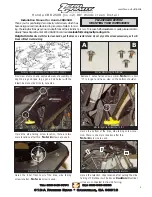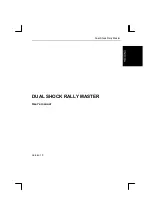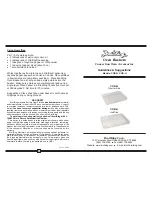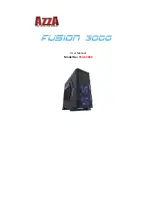
4
10 Quick starting system
Important:
– Only use the included starter cables.
– Clean corroded or dirty vehicle battery terminals before connecting the cables.
– Do not use if a cable or clip is damaged.
– To prevent damage to the product, only use with 12 V vehicle onboard systems.
– Never short circuit the two pole terminals e.g. Do not clamp both cables together or to the same
piece of conductive material.
10.1 Before jump starting the vehicle
■
Prepare vehicle for ignition. Place gear in park/neutral and engage the emergency brake.
■
Switch off all vehicle electronics e.g. air conditioner, heater, radio, and lights.
■
Make sure there is at least 50% charge in the starter.
10.2 Normal starting method
Important:
If ignition fails after 3 attempts, disconnect the quick start system, wait 5 mins then try the
1.
Connect the starter cables plug to the starter cables socket.
2.
Clip the red and black cables to the electrodes of the vehicle battery in the following sequence.
– Red clamp to positive (+).
– Black clamp to negative (-).
3.
Check the starter status indicator:
– Alternating red/green flashing (normal) → proceed to step 4.
– Other LED status: see section
4.
Attempt to start the vehicle.
– Do not start the ignition for more than 3 secs at a time.
– Allow the starter to cool down for 30 secs between each start attempt.
– Maximum 3 attempts within 2 mins.
5.
If the engine starts, disconnect the black terminal followed by the red terminal. Replace the sockets
cover.
Let the vehicle run for approx. 30 mins to recharge the battery.
10.3 Force starting method
Important:
Use this method if the normal starting method fails.
If ignition fails after 3 attempts, disconnect the quick start system and contact a specialist
workshop.
1.
Connect the starter cables plug to the starter cables socket.
2.
Clip the red and black cables to the electrodes of the vehicle battery in the following sequence.
– Red clamp to positive (+)
– Black clamp to negative (-)
3.
Check the starter status indicators:
– Alternating red/green flashing (normal) → proceed to step 4.
– Other LED status: see section
4.
Press and hold the
Force Start Button
for 3 secs until the status LED lights solid green.
– Start the vehicle within 30 seconds after the LED lights solid green.
– Attempt to start the vehicle. Do not start ignition for more than 3 secs at a time.
– Allow the starter to cool down for 30 secs between each start attempt.
– Maximum 3 attempts within 2 mins.
5.
If the engine starts, disconnect the quick start system and replace the sockets cover.
Let the vehicle run for approx. 30 mins to recharge the battery.
11 Status indicators
11.1 Normal
Status indicator
Status
Alternating red/green flashing
Quick start system is ready/starting in progress.
Green steady on
Force start mode is activated.
11.2 Protection mode
Status indicator
Status
Red steady/red flashing
Connection error. Please check all contacts.
Red on/alarm sound on
■
Reversed polarity: check if the clamps are connected the wrong way
around.
■
Short-circuit: Both cables are clamped together or clamped to the
same piece of conductive metal.
Red steady on
■
Reverse charging protection is triggered. Voltage of the connected
battery is >12.6 V.
■
The jump starter is not needed as the vehicle battery is enough to start
the vehicle.
Red flashing quickly
Over temperature: Clamp >65 (±5) ºC. Remove the clips until the starter
status indicator returns to normal (alternating red/green flashing).
Green flashing slowly
Quick start battery charge is too low, recharge it.
12 Cleaning and care
NOTICE! Do not use aggressive cleaning agents, rubbing alcohol or other chemical solutions as
they can cause damage to the housing and malfunctioning.
1. Disconnect the product from the power supply.
2. Clean the product with a dry, fibre-free cloth.
13 Disposal
Electronic devices are recyclable waste and must not be disposed of in the household waste.
At the end of its service life, dispose of the product in accordance with applicable regulatory
guidelines.
You thus fulfill your statutory obligations and contribute to the protection of the environment.
14 Technical data
14.1 General
Charging input (Micro-USB) ..................
5 V/DС 2.1 A
Charging input (USB-C
TM
)......................
5 V/DC 3 A, 9 V/DC 3 A,12 V/DC 2.5 A, 20 V/DC 1.5 A (max.
30 W)
5 V/DC 3 A, 9 V/DC 2 A, 12 V/DC 1.5 A (max. 18 W)
Battery pack (rechargeable) ..................
14.8 V 59.2 Wh, Li-ion (non-removeable),16000 mAh (4x type
6272100)
Recharge time (battery pack) ................
USB-C
TM
30 W adaptor: 3 hours
Micro-USB adaptor: 8 hours
LED light modes ....................................
Constant ON → SOS → flashing → OFF
Ingress protection ..................................
IP67
Protection ..............................................
Short circuit, overload, low voltage, over voltage, overcharge,
over temperature, reverse charging, reverse polarity
Over-discharge protection .....................
≤13 V ±0.3 V
Over-temperature protection .................
>65 ºC ±5 ºC
Reverse charging protection..................
≥(12.6 V ±0.3 V)
Operating conditions..............................
Sockets cover open: -20 to +60 ºC, 40 – 85 % RH (non-con-
densing)
Sockets cover closed: -20 to +60 ºC
Storage conditions.................................
Sockets cover open: 0 to 45 ºC, 40 – 85 % RH (non-condens-
ing)
Sockets cover closed: 0 to 45 ºC
Dimensions (L x W x H).........................
198 x 100 x 45 mm
Weight ...................................................
770 g
14.2 Power bank
Charger output (USB-C
TM
).....................
5 V/DC 3 A, 9 V/DC 3 A,12 V/DC 2.5 A, 20 V/DC 1.5 A (max.
30 W)
5 V/DC 3 A, 9 V/DC 2 A, 12 V/DC 1.5 A (max. 18 W)
Charger output (2x USB-A) ...................
5 V/DC 3 A, 9 V/DC 2 A, 12 V/DC 1.5 A (max. 18 W)
14.3 Jump starter
Vehicle on-board system .......................
12 V/DC
Start current (peak value) ......................
600 A (1200 A)
Jump starts ............................................
approx. 15 (affected by factors such as ambient temperature,
size, and mechanical condition of the engine)
Suitable engine types ............................
Gasoline (displacement ≤8.0 L), Diesel (displacement ≤6.0 L)
This is a publication by Conrad Electronic SE, Klaus-Conrad-Str. 1, D-92240 Hirschau (www.conrad.com).
All rights including translation reserved. Reproduction by any method (e.g. photocopying, microfilming or the capture in
electronic data processing systems) requires prior written approval from the editor. Reprinting, also in part, is prohibited.
This publication reflects the technical status at the time of printing.
Copyright by Conrad Electronic SE.
*2353911_V4_0821_dh_mh_en


























